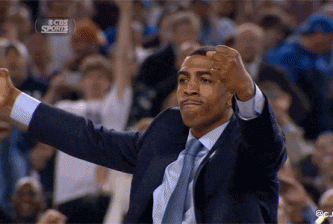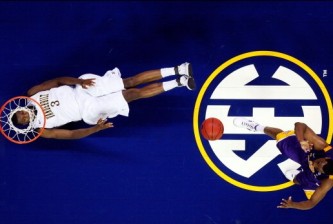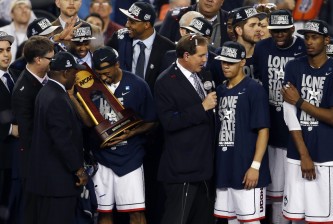
Reporting on college hoops can by subdivided into any number of genres. Like a lot of geeks (who can cross you over), I'm a big fan of statistical based pieces that reveal the inner-workings of a team or a game in a way that challenges our current understanding. But others prefer something with a bit more narrative. They want to know background stories. They want hear what a coach was thinking when he made a particular move. There are the previews – seasons, games, "keys to the half." There are recaps. There's a broad spectrum of recruiting angles. There is the X's and O's. But there's one story that seems to unite all interests, and that's the expose. Those stories are real. They're dark. They're dirty. There's a clear right and wrong and we get to be the judge. The most current in that genre is Pete Thamel's piece in Saturday's New York Times. If you haven't read it you should do so. It's intriguing stuff. I don't need to recap it, except to say that it's more of what we've come to expect: grown men exploiting talented kids to make a buck.
Every expose sets off waves of reaction. And every expose ends up with other writers sitting down and explaining how to keep those sordid dealings from happening again. The first one I turned to following Thamel's story was Christopher Johnson's post at Rush the Court. It's a well-developed, solidly written reaction to the New York Times. It's also completely misguided.
Johnson latches on to exactly what the NCAA would like him to latch on to: amateurism. Early in the piece he states that "…the unlawful behavior runs rampant in a regulated system that stresses, above all else, amateurism and athletic integrity." And he concludes his essay with this:
What’s clear is that the NCAA needs to strengthen its oversight and influence over the increasingly sinister college athletics landscape. How it works toward that end remains unclear, but unless more effective policy is installed, the status quo will struggle to limit the illicit behavior jeopardizing its fundamental mission statement: amateurism.
Johnson is arguing from the point that the NCAA isn't doing enough to protect it's amateur athletes. They need to strengthen their laws. They need to protect their amateurs from nefarious men who don't have the athletes best interests in mind (as the NCAA surely does).
The problem with this argument is that the NCAA clearly does not have the best interest of their amateur athletes in mind. Even Myles Brand, the former NCAA President (to the tune of a $1.15 million dollar salary for supervising the amateur scene), thought that the "amateur" label had outlived its usefulness.
Just the major conference schools make over $300 million in profits from college basketball (and this is dwarfed by football). The NCAA earns more than 90% of its operating revenue from the NCAA basketball tournament alone. CBS television invested $10.8 billion for the rights to broadcast that tournament. Meanwhile, the labor (re: amateur athletes) receive – via a collective agreement which they had no part in drafting – a maximum reward of tuition, room and board, and a few other amenities. And that's really their only option because the rich athletes who make up the NBA players union, and the rich old dudes who make up the NBA ownership have colluded to force them out of their profession for at least one year following high school. The players union wants to protect existing jobs. The NBA execs wants another year to scout talent. Never mind that Nerlens Noel shouldn't even be in college – he should be getting paid millions to do what he'll do for free books and classes. But first his coach, his school, and the NCAA need to make a buck off him.
As in any multi-billion dollar industry – criminals have figured out a way to get their cut. Kids are sold to schools. Kids are given benefits under implied agreements that those benefits will be paid back, with extreme interest, once that kid can play for pay.
Falling for the myth of amateurism means that your solutions involve more rules to keep this from happening.
But the bigger problem might be beyond the scope of criminality. There are the ones who learn how to game the system from within. Why did Dalonte Hill go from an AAU coach to the highest paid assistant in the country in just a few years? It wasn't what he knew, it was who he knew. Or more importantly, who he could convince to play at Kansas State. So he's getting paid.
Why is the average salary of big time head coaches approaching $2 million per season? Where is all this money coming from in amateur athletics? It's a system where a lot of guys are living in really big houses because they're coaching (or providing admin to) a lot of guys who are scrounging for change in the couch cushions so that they can go to the fast food joint. But they're amateurs, so it's all good.
To point out the obvious – it (the legal and illegal profiteering) is going to keep happening, even if Mr. Johnson's solutions are implemented. One thing is consistent in this world – where there are huge piles of money, there are people who will work full time figuring out how to get at it. The NCAA already has an inscrutable set of rules which no one really understands – rules which typically lead to players being suspended for accepting a cab ride from the wrong person or for any number of equally ridiculous reasons.
What other industry allows 345 employers (with tax exempt status) to form a wage cartel, and then to use that labor to generate 56% profit margins? Focusing on the "amateur" label so clinged-to by the NCAA makes sure that the arguments will continue to be defined by red herrings. Which is exactly what the NCAA wants.
So yes, stories like one researched by Pete Thamel are a huge problem in college athletics. But allowing the NCAA to "fix" the problem by increasing its bureaucratic footprint will never be the answer. It's time to ditch the "amateur" label and to call it what it is. If the courts and general public decide that enjoying these sporting events is more important than fixing the inequality, then so be it. But don't allow the NCAA to hide behind the curtain of semantics.
The unique thing about non-profits are that they are mission driven. And to make this easy to follow they have mission statements. The NCAA's is as follows: "Our purpose is to govern competition in a fair, safe, equitable and sportsmanlike manner, and to integrate intercollegiate athletics into higher education so that the educational experience of the student-athlete is paramount."






















